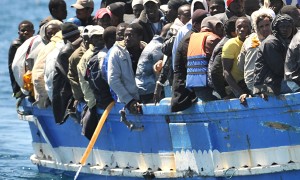Syrian refugees being failed by rich countries – report
Wealthy nations are failing to do their fair share in giving sanctuary to Syrian refugees, with just 1.39 per cent having been resettled by first world countries, according to a new report by Oxfam.
Oxfam’s analysis came as Syria’s civil war approaches a five year anniversary.

A new report from Oxfam reveals that wealthy nations are failing to do their part in providing sanctuary to refugees
The charity said twenty-eight of the world’s richest nations have pledged to take in 129,966 people between them. But this is less than a third of what they should be committing to; and just 67,000 people have been resettled so far.
Campaigners are demanding that wealthy countries should take in more refugees, with the UN High Commissioner for Refugees having estimated that almost half a million are very vulnerable and in urgent need of being resettled.
Just three countries, Canada, Germany, and Norway, have made pledges exceeding their ‘fair share’, something which is calculated according to the size of their economy. But 25 out of the 28 countries are falling far short in the number they have promised to take in.
Australia has committed to take 12,000 Syrian refugees above the 13,750 refugees it takes in annually under its humanitarian settlement program.
The analysis pointed the finger at underperforming countries such as Japan, Russia, and South Korea who have collectively pledged to resettle more than 100,000 people but have yet to take in a single Syrian refugee.
“To date the response to calls of increased resettlement of vulnerable refugees has been disappointing, and there is an opportunity for states to mark a change of course,” the report says.
Campaigners are demanding that rich countries take in 10 per cent of Syrian refugees, some 481,000 people, by the end of this year.
Mark Goldring, chief executive of Oxfam UK said wealthy nations needed to do more.
“It’s shocking that while people continue to flee Syria most countries have failed to provide a safe home for the most vulnerable,” Mr Goldring said
“Lebanon, Jordan and Turkey are struggling to cope with almost five million Syrian refugees. Rich nations should be doing more to share the responsibility and offer refuge to some of the most vulnerable women and children affected by this crisis.”
A spokesperson for the United Nations High Commissioner for Refugees (UNHCR) said refugee flows were a global responsibility.
“This is an issue not just for those countries neighbouring war zones. The Syria crisis is so vast. We simply need more countries to share the load by taking a greater share of refugees from what has become the biggest displacement crisis of a generation,” the spokesperson said.
The Oxfam analysis shows wealthy countries have resettled less than 2 percent of the world’s Syrian refugees, a “fraction” of the 5 million Syrians who have fled the country over the past five years.
It says a country’s “fair share” is calculated based on the size of its economy and thus its ability to take in large numbers of people.
Having pledged 9,000 spaces and having a “fair share” total of 3,612, Norway has been the most welcoming of the rich countries, followed by Canada and Germany.
Australia, Finland, Iceland, Sweden and New Zealand have pledged more than half of their fair share of resettlement spaces.
Greece, Japan, South Korea, Russia and Slovakia have pledged zero resettlement or admission spaces for Syrian refugees, despite the combined “fair share” total of the five countries exceeding 105,000 places.
The United Kingdom has pledged 22 percent of its “fair share” total, while the United States, which has a fair share total of more than 170,000, has pledged 7 percent.
Five years into the Syrian crisis, more than 4.8 million Syrian people are now refugees in Turkey, Lebanon, Jordan and elsewhere in the region.
Nearly 150,000 refugees and migrants have entered Europe via the Mediterranean Sea this year, according to the United Nations refugee agency (UNHCR).
The majority of them are women and children from Syria, Afghanistan and Iraq.
A recent deal signed between the EU and Turkey aims to stop the migrant flow to Europe by detaining refugees and migrants on the Greek islands, where they risk being sent back to Turkey.
But the closure of the Balkan migration route will lead to greater numbers of migrants seeking to come to Europe from Libya, where the terrorist group ISIS has increased its grip, refugee campaigners says.
This week the Libyan coastguard announced it had stopped three migrant boats from sailing to Europe from Sabatha, around 70 km west of the capital, Tripoli. The boats were carrying 600 migrants from Africa, 80 of whom were women, one of whom was pregnant.
A Libyan coastguard spokesman estimated that since the beginning of 2016, 2,000 migrants have attempted to sail to Europe from the Libyan coast per day.
On Monday the Italian coastguard announced it had rescued 1,482 migrants in operations off the Libyan coast over the previous two days, and last week the UNHCR said that nearly 14,500 migrants had arrived in Italy via Libya since the start of the year, a 42.5 percent increase over the same period a year earlier.
Laurie Nowell
AMES Australia Senior Journalist












